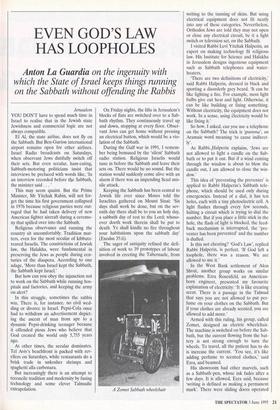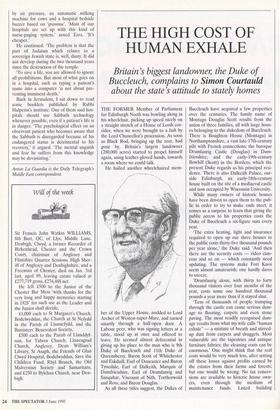EVEN GOD'S LAW
HAS LOOPHOLES
Anton La Guardia on the ingenuity with
which the State of Israel keeps things running on the Sabbath without offending the Rabbis
Jerusalem YOU DON'T have to spend much time in Israel to realise that in the Jewish state Jewishness and commercial logic are not always compatible.
El Al, the state airline, does not fly on the Sabbath. But Ben-Gurion international airport remains open for other airlines. Israel Radio broadcasts on Saturdays, when observant Jews dutifully switch off their sets. But even secular, ham-eating, Sabbath-motoring politicians insist that interviews be prefaced with words like, 'In an interview recorded before the Sabbath, the minister said . . . '
This may seem quaint. But the Prime Minister, Mr Yitzhak Rabin, will not for- get the time his first government collapsed in 1976 because religious parties were out- raged that he had taken delivery of new American fighter aircraft during a ceremo- ny that spilled over into the Sabbath.
Religious observance and running the country sit uncomfortably. Tradition mat- ters, even for the most secular of kibbutz- reared Israelis. The constrictions of Jewish law, the Halakha, were fundamental in preserving the Jews as people during cen- turies of the diaspora. According to one adage, 'More than Israel kept the Sabbath, the Sabbath kept Israel.'
But how can you obey the injunction not to work on the Sabbath while running hos- pitals and factories, and keeping the army on alert?
In this struggle, sometimes the rabbis win. There is, for instance, no civil wed- ding or divorce in Israel. Pepsi-Cola once had to withdraw an advertisement depict- ing the ascent of man from ape to a dynamic Pepsi-drinking teenager because it offended pious Jews who believe that God created the world only 5,755 years ago.
At other times, the secular dominates. Tel Aviv's beachfront is packed with rev- ellers on Saturdays, while restaurants do a brisk trade in unkosher shrimps and spaghetti alla carbonara.
But increasingly there is an attempt to reconcile tradition and modernity by fusing technology and some clever Talmudic extrapolation. On Friday nights, the lifts in Jerusalem's blocks of flats are switched over to a Sab- bath rhythm. They continuously travel up and down, stopping at every floor. Obser- vant Jews can get home without pressing an electrical button, which would be a vio- lation of the Sabbath.
During the Gulf war in 1991, I remem- ber being bemused by the 'silent' Sabbath radio station. Religious Israelis would tune in before the Sabbath and leave their sets on. There would be no sound. But the station would suddenly come alive with an alarm if there was an impending Scud mis- sile attack.
Keeping the Sabbath has been central to Jewish life ever since Moses told the Israelites gathered on Mount Sinai: 'Six days shall work be done, but on the sev- enth day there shall be to you an holy day, a sabbath day of rest to the Lord; whoso- ever doeth work therein shall be put to death. Ye shall kindle no fire throughout your habitations upon the sabbath day' (Exodus 35:ii).
The sages of antiquity refined the defi- nition of work to 39 prototypes of labour involved in erecting the Tabernacle, from A Zomet .Sabbath wheelchair writing to the tanning of skins. But using electrical equipment does not fit neatly into any of these categories. Nevertheless, Orthodox Jews are told they may not open or close any electrical circuit, be it a light switch or television set, on the Sabbath.
I visited Rabbi Levi Yitzhak Halperin, an expert on making technology fit religious law. His Institute for Science and Halakha in Jerusalem designs ingenious equipment such as Sabbath telephones and water- heaters.
`There are two definitions of electricity,' said Rabbi Halperin, dressed in black and sporting a disorderly grey beard. 'It can be like lighting a fire. For example, most light bulbs give out heat and light. Otherwise, it can be like building or fixing something. Without electricity, the equipment does not work. In a sense, using electricity would be like fixing it.'
So how, I asked, can you use a telephone on the Sabbath? The trick is 'gramma', an Aramaic word meaning `to cause indirect- ly'.
As RabbiNlialperin explains, 'Jews are not allowed to light a candle on the Sab- bath or to put it out. But if a wind coming through the window is about to blow the candle out, I am allowed to close the win- dow.'
This idea of 'preventing the preventer' is applied to Rabbi Halperin's Sabbath tele- phone, which should be used only during emergencies. Instead of a dial, it has ten holes, each with a tiny photoelectric cell. A light flashes through every few seconds, halting a circuit which is trying to dial the number. But if you place a little stick in the hole, the flash of light is blocked, the feed- back mechanism is interrupted, the 'pre- venter has been prevented' and the number is dialled.
Is this not cheating? 'God's Law', replied Rabbi Halperin, is perfect. 'If God left a loophole, there was a reason. We are allowed to use it.'
In the West Bank settlement of Alon Shvut, another group works on similar problems. Ezra Rosenfeld, an American- born engineer, presented my favourite explanation of electricity: 'It is like creating scent. There is a passage in the Talmud that says you are not allowed to put per- fume on your clothes on the Sabbath. But if your clothes are already scented, you are allowed to add more.'
Armed with this ruling, his group, called Zomet, designed an electric wheelchair. The machine, is switched on before the Sab- bath, but the current flowing from the bat- tery is not strong enough to turn the wheels. To travel, all the patient has to do is increase the current. 'You see, it's like adding perfume to scented clothes,' said Ezra, and beamed.
His showroom had other marvels, such as a Sabbath pen, whose ink fades after a few days. It is allowed, Ezra said, because `writing is defined as making a permanent mark'. There were sliding doors operated by air pressure, an automatic milking machine for cows and a hospital bedside buzzer based on 'gramma'. 'Most of our hospitals are set up with this kind of nurse-paging system,' noted Ezra. 'It's cheaper.'
He continued: 'The problem is that the part of Judaism which relates to a sovereign Jewish state is, well, dusty. It did not develop during the two thousand years since the destruction of the temple.
`To save a life, you are allowed to ignore all prohibitions. But most of what goes on in a hospital, such as typing a patient's name into a computer 'is not about pre- venting imminent death.'
Back in Jerusalem, I sat down to read some booklets published by Rabbi Halperin's institute. One of them said hos- pitals should use Sabbath technology whenever possible, even if a patient's life is in danger. 'The psychological effect on an observant patient who becomes aware that the Sabbath is disregarded because of his endangered status is detrimental to his recovery,' it argued. 'The mental anguish and fear he suffers from this knowledge may be devastating.'
Anton La Guardia is the Daily Telegraph's Middle East correspondent.



































































 Previous page
Previous page